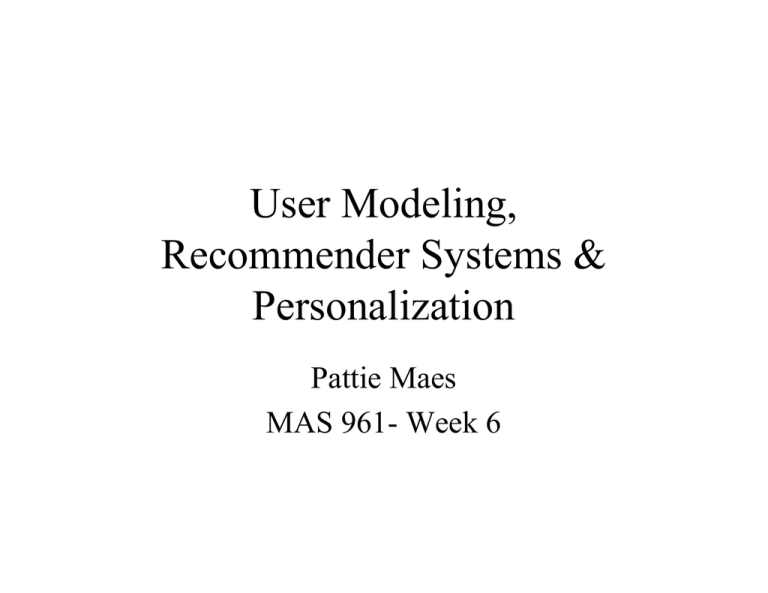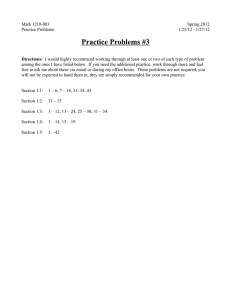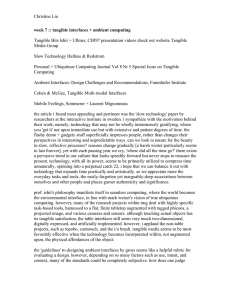User Modeling, Recommender Systems & Personalization Pattie Maes
advertisement

User Modeling, Recommender Systems & Personalization Pattie Maes MAS 961- Week 6 Recommender Systems: General idea User profile (info about user) compare Set of items e.g. news articles, books, music, movies, products, … Recommend items user will like Personalization: General Idea Personalization = user adaptive systems User profile interaction is adapted based on data about an individual user Eg personal websites, personalized tutoring, personalized recommendations, etc. Why relevant to this class? Ambient Intelligence = Ubiquitous Computing + Intelligent Interfaces (eg personalization) User Profile simple • demographical info – Age, gender, location, … • • • • • complex Interests, preferences, expertise level, … Purchase records, observed behavior Ratings … complete “lifelog” Source of User Profile • Entered explicitly by user (questionnaire) • Gathered implicitly by system – Observing/recording person’s behavior – Learning/inferring interests/preferences/level… • Combination of both approaches • Another dimension: public/private Acquired User Profiles Form: - raw data - generalization (find patterns & generalize) - statistical ML methods - knowledge based ML methods - keep both forms (to relearn/adapt over time) - keep “window” of raw data Generic User Modeling • Separate user modeling from applications/use – Reusable across applications • Still mostly theory, not practice • State of art: every application does its own user modeling specific to the task at hand Recommendation algorithms • Case-based/Stereotype based • Feature-based/Content-based • Collaborative Filtering Case-Based/Stereotype-Based • Acquire info about user • Classify user in a bucket (as a particular “case” or stereotype) based on facts about user – Eg soccer moms, poor grad student, … (there may be a hierarchy, rather than list of stereotypes) • Certain assumptions about what appeals to a certain stereotype – Eg which items appeal to certain case/category of users • Recommend those to the user • Example: demographics-based recommendations Feature-based/Content-based Filtering • One approach: learning from item examples – Look at all items a user likes • Features of items – Find patterns among items and generalize (often also involves clustering) – Then recommend more items that fit same pattern(s) – Eg recommend movies based on features of those movies (genre, actors, …) Feature-based/Content-based Filtering • Another approach: learning stereotypes from user examples – – – – Given a category of items Given set of users with features & values Given information on which users like what items Generalize on what types of users like a category of items – Recommend items based on what case user falls into Knowledge-based Techniques • Special case of feature-based where background knowledge of item space or user space is used to generalize • Eg use ConceptNet or Interest Map – Know what people are related (InterestMap) – Know what items are related (ConceptNet) Collaborative Filtering users items Sparse matrix of ratings (or purchase patterns) Algorithms: recommend items based on item similarities (rows) or based on user similarities (colums), typically weighted average of K nearest neighbors, with weight inverse proportional to distance Pros & Cons different techniques • Collaborative filtering – Pros: • Does not require analysis of the items (features) • Better at qualitative judgements – Cons: • Bootstrapping • Ratings required • Critical mass required Mixed Techniques • Use ratings as additional features in the generalization task – ML algorithm can learn what features are best predictors (content features or ratings by others or both) User Profile • Short term information – Eg current context, current activity/focus • Long term info – Eg longer term interests • You typically want to use both • Update them on different timescale Location of User Profile • Centralized – Generic – Device & application independent – Easier to apply generalization across users • Distributed – Mobile use – Better privacy • Mixed forms Tunnel vision problem & importance of serendipity • Feedback loop: – Systems recommends items of type X – User consumes items of type X • Importance of “exploration” or “serendipity” (recommending items outside user’s interest space) Avoiding the tunnel vision problem Highlight recommendations but present all choices Other problems • Noisy/incorrect data used in user modeling – User needs to be able to inspect & “correct” user model • Trust – Recommendation system needs transparency!! • Privacy • Control Variant: one person as recommender • E.g. see world through Marvin’s eyes • Have a famous critic as your guide Next Week:Ambient & Tangible Interfaces • Required reading: – Ishii & Ullmer, Media Lab, Tangible bits, Chi 97, http://web.media.mit.edu/~anjchang/ti01/ishiichi97-tangbits.pdf Next Week:Ambient & Tangible Interfaces • Gross’ work- Frauenhofer - Amy – Ambient Interfaces: design challenges & recommendations http://ieeexplore.ieee.org/xpl/abs_free.jsp?arNumber= 994231 – Ambient Interfaces in a web-based theater of work • Cohen & McGee, Tangible Multi-modal Interfaces - Amy http://www.cse.ogi.edu/CHCC/Publications/cacmactual.pdf • Personal & Ubiquitous Computing Journal Vol 8 Nr 5 Special Issue on Tangible Computing – selection – Edison (2) & Minna (2)

